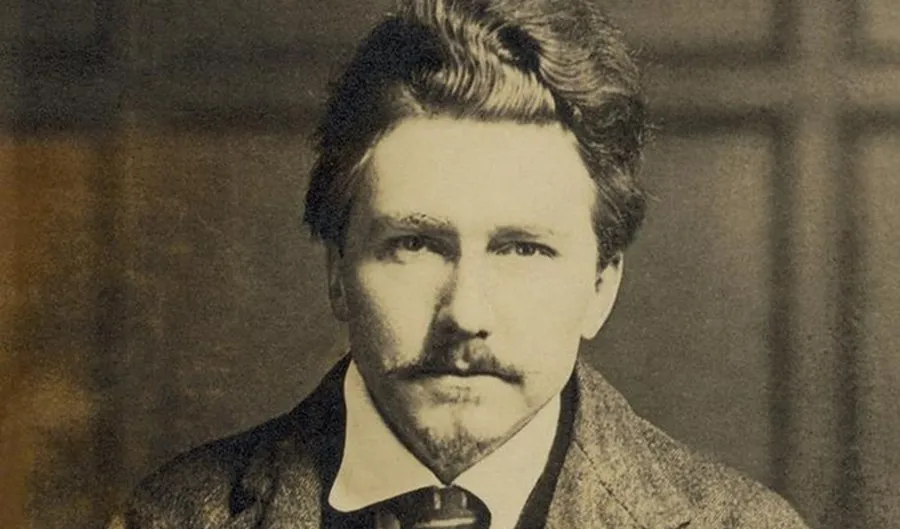
Ezra Pound (30 October 1885 – 1 November 1972) was an American poet and literary critic who was an important exponent of the Imagist poetry movement. He and Eliot were both leading figures in late Symbolist poetry. He derived the theory of "poetic imagery" from classical Chinese poetry and Japanese haiku, and made outstanding contributions to the mutual reference of Eastern and Western poetry.
Psalms (45)*
With usury
With usury there is no good stone house —
Each piece is polished smoothly, and the seams are closed,
The surface is carved with patterns,
No one painted heaven on the walls of the church
Painted on harp and harp 1
Or paint the Virgin Mary receiving the Divine Revelation
The engraved line draws the aura
No one could see Gonzaga and his heirs, wives and concubines again2
None of the paintings were made for appreciation, for the sake of passing on,
It's all about selling for money, and it's all about selling fast
With usury, this sin against nature,
Your bread will always be like rags,
Your bread is as dry as a piece of paper,
There is no mountain wheat, no thick flour
With usury lines also become thicker,
With usury there is no clear demarcation3
No one can find a home for themselves.
Stone carvers could not get close to the stones
The weaver could not get close to the cloth machine
Wool is not listed on the set
Raising sheep with loan sharks is not counted
Usury is the plague, usury
Filed bluntly the needle in the girl's hand
The dexterous hands of the spinners became clumsy, and the usury could not be summoned
Pietro Lombardo 4
Loan sharks can't summon Duzio 5
Piero della Francesca 6 does not appear;
Juan Bellini 7 will also not appear.
"La Calunnia" 8 could not be painted.
There will be no Angelico 9; there will be no Ambrogio Perladis 10
Nor will there be a church inscribed on the carved stone with "Adam build me".11
The Church of St. Tropheem 12 was not made of usury
St. Hilaire's Church 13 was also not made of usury
Loan sharks rust the chisels
Make both craftsmen and craftsmen rusty
Bite off the thread on the loom
Weaving gold thread in the pattern is lost
Usury makes the azure fester, so that the bright red cloth cannot be embroidered,
Make Emerald Green can't find Menglin 14
The usurer kills the children of the subordinates
It hinders the pursuit of young people
It took the mad paralysis to bed and slept there
Between the bride and her groom
Defying nature 15
As instructed by usury:
They brought prostitutes into the 16th Temple of Eleusis
And the zombies were invited to the table.
- From Fifty Verses (1937)
(Translated by Zhao Yiheng)
Translation Notes:
* Pound's political and economic views were very confused, he was dissatisfied with capitalist society, but believed that the problem was all about money, and that usury "represented by the Jews" was the source of all evil.
1 These two lines are a reference to the French poet Virgon's poem "A Song of Prayer to the Virgin> "The heavens painted by the monastery have harps and harps. ”
2 Refers to the famous fresco of the Italian painter Andreco Montena (1431-1506) for the Grand Duke of Montua: "Gonzaga, his heirs, his wives and concubines."
3 In many of his writings, Pound argues that the color, lines, and techniques of painting show how much an era is controlled by "usury."
4 Pietro Lombardo (1435–1515), Italian architect and sculptor, designer of Dante's tomb.
5 Duzio (1260?-1318?), Italian sculptor, known for his reliefs.
6 Pi de Francesca (1420?-1492), Italian painter.
7 Juan Bellini (1430?-1516), Italian painter and leader of the Venetian School.
8 Famous paintings by the Italian painter Sandro Porticelli, in the Uffizi Gallery in Florence.
9 Angelico (1387-1455), Italian painter, belonged to the Florentine school.
10 Ann Pradis (1455?-1506?) Portrait of Milan, Italy.
11 Original Latin, inscription on the column of the Church of San Seno in Verona, Italy.
12 Medieval classrooms in the Aals place in France.
13 Medieval classrooms in the place of Poitiers, France.
14 Meng Lin (1430?-1495), early Flemish painter.
15 The original text is In Latin.
16 An ancient city in the attica area near Athens, home to a famous ancient Greek religious temple.
| from Selected Modern American Poetry, edited by Zhao Yiheng, Foreign Literature Publishing House, 1985